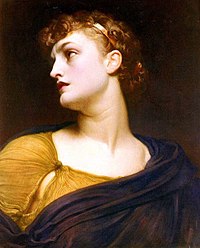Antigone: Difference between revisions
No edit summary |
No edit summary |
||
| Line 89: | Line 89: | ||
[[zh:安提戈涅]] |
[[zh:安提戈涅]] |
||
Because antigone is the absolute dumbest story ive ever read in my life |
Because antigone is the absolute dumbest story ive ever read in my life |
||
1512 |
|||
Revision as of 19:24, 4 March 2009
- This article is about the daughter of Oedipus. For the daughter of Eurytion, see Antigone (daughter of Eurytion). For other uses, see Antigone (disambiguation).

Antigone (Template:PronEng; Greek Ἀντιγόνη) is the name of two different women in Greek mythology. The name may be taken to mean "unbending", coming from "anti-" (against, opposed to) and "-gon / -gony" (corner, bend, angle; ex: polygon), but has also been suggested to mean "opposed to motherhood" or "in place of a mother" based from the root gone, "that which generates" (related: gonos, "-gony"; seed, semen).
Classical depictions
Antigone is a daughter of the accidentally incestuous marriage between King Oedipus of Thebes and his mother Jocasta (thus, Antigone is also her father Oedipus's half-sister and, through her father, her mother Jocasta's granddaughter). She is the subject of a popular story in which she attempts to secure a respectable burial for her brother Polyneices, even though he was a traitor to Thebes.
In the oldest version of the story, the funeral of Polyneices takes place during Oedipus's reign in Thebes. However, in the best-known versions, Sophocles's tragedies Oedipus at Colonus and Antigone, it occurs in the years after Oedipus's banishment and death, and Antigone has to struggle against Creon. Sophocles' Antigone ends in disaster, and Creon's son Haemon (or Haimon), who loved Antigone, kills himself. (Also see Oedipus for a variant of this story.) Queen Eurydice, wife of King Creon, also kills herself at the end of the story due to seeing such actions allowed by her husband. She had been forced to knit throughout the entire story and her death alludes to Greek Mythology's 3 Fates.
The dramatist Euripides also wrote a play called Antigone, which is lost, but some of the text was preserved by later writers and in passages in his Phoenissae. In Euripides, the calamity is averted by the intercession of Dionysus and is followed by the marriage of Antigone and Haemon.
Different elements of the legend appear in other places. A description of an ancient painting by Philostratus (Imagines ii. 29) refers to Antigone placing the body of Polynices on the funeral pyre, and this is also depicted on a sarcophagus in the Villa Doria Pamphili in Rome. And in Hyginus' version of the legend, founded apparently on a tragedy by some follower of Euripides, Antigone, on being handed over by Creon to her lover Haemon to be slain, is secretly carried off by him and concealed in a shepherd's hut, where she bears him a son, Maeon. When the boy grows up, he attends some funeral games at Thebes, and is recognized by the mark of a dragon on his body. This leads to the discovery that Antigone is still alive. The demi-god Heracles then intercedes, pleading in vain with Creon for Haemon, who slew himself after finding Antigone's corpse. This intercession by Heracles is also represented on a painted vase. (Heydermann, Über eine nacheuripideische Antigone, 1868).
Adaptations
The story of Antigone has been a popular subject for books, plays, and other works, including:
- Antigone, one of the three Theban plays by Sophocles (497 BC - 406 BC) - The most famous adaptation
- Antigone, play by Jean Cocteau (1889-1963)
- Antigone, full-length album by Heaven Shall Burn (2004)
- Antigone, opera by Carl Orff (1895-1982)
- Antigone, play by Jean Anouilh (1910-1987)
- "Antigone-Legend", for soprano and piano (text by Bertolt Brecht), by Frederic Rzewski (b. 1938)
- Antigone, opera by Mikis Theodorakis (b. 1925)
- Antigone (1990/1991), opera by Ton de Leeuw (b. 1926)
- Antígona Furiosa (Furious Antigone), play by Griselda Gambaro (b. 1928)
- "The Island", play by Athol Fugard (b. 1932)
- La Pasión Según Antígona Pérez (The Passion of Antigone Pérez), adaptation of Sophocles by Puerto Rican writer Luis Rafael Sánchez (b. 1936), updated to 20th century Latin America
- Tegonni, An African Antigone by Femi Osofisan (b. 1946)
- Antigone, adaptation of Sophocles' play by Peruvian poet José Watanabe (b. 1946)
- Antigone, opera by Mark Alburger (b. 1957)
- Antigone play by Andy Wibbels (b. 1975)
- Antigone, comic book by David Hopkins (b. 1977)
- Antigone by Henry Bauchau
- The Burial at Thebes by Seamus Heaney
- The Burial At Thebes opera by Dominique Le Gendre to a libretto by Seamus Heaney
- Governing Alice by C. Denby Swanson
- Echo Boom by Caitlin Montanye Parrish
- Dear Antigone a song by The Breathing Process
Further reading
- Antigones by George Steiner. An examination of the legacy of the myth and its treatment in Western art, literature, and thought—in drama, poetry, prose, philosophic discourse, political tracts, opera, ballet, film, and even the plastic arts. [1]
References
- This article incorporates text from a publication now in the public domain: Chisholm, Hugh, ed. (1911). Encyclopædia Britannica (11th ed.). Cambridge University Press.
{{cite encyclopedia}}: Missing or empty|title=(help)
External links
- Antigone full English translation by Ian Johnston
- G.Theodoridis. Full translation:[1]
Because antigone is the absolute dumbest story ive ever read in my life 1512
